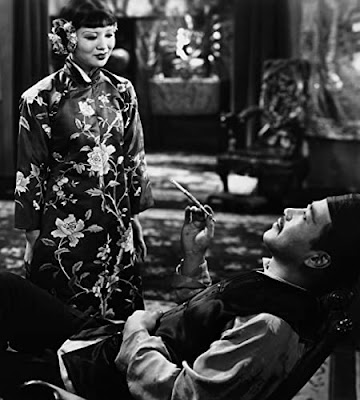Starring: Phyllis Barrington, Jason Robards, John Harron, Frank Lackteen, and Dot Farley
Director: Lewis D. Collins
Rating: Four of Ten Stars
An honorable Chinese gangster (Robards) has a chance encounter with a dancehall girl (Barrington) that ends up changing both their lives forever.
"The Law of the Tong" is a somewhat dull affair with a story that features a mix of interesting and inexplicably stupid characters, as well as equal parts halfhearted moralizing, nonsensical Orientalism, and underdeveloped intrigue.
The film would be unwatchable if not for a pair of interesting characters at its center--Joan (Phyllis Barrington), and Charlie Wong (Jason Robards). Wong is a Chinese gangster whose agendas and ultimate goal is utterly inscrutable. He is clearly operating a human smuggling ring, and he is involved in a gang war, but he claims that his objective is to bring poor Chinese people into the United States where they can enjoy the better life he has found. He is also never anything but courteous and respectful toward Joan and he goes FAR out of his way to help her and turn her life away from an inevitable slide into prostitution. Meanwhile, Joan emerges as a fascinating character when she become caught in the middle between her friendship with Charlie Wong and the nerdy, self-righteous undercover detective Doug (John Harron) who is going to get himself killed while trying to bring down Wong's smuggling ring. In a better, slightly longer film, there would probably have been more development of Wong and Joan... I for one would have enjoyed getting to know both of them better.
I think this film also shows that it's a shame Phyllis Barrington only made a dozen or so movies. She lights up the screen whenever she appears, and her charisma shines brightly both opposite Robards and Harron.
And speaking of Harron: The third main character in the film, Doug, is interesting only insofar as he is not as bland and uninteresting as the supposed romantic leads in these sorts of films tend to be; otherwise, he is merely the catalyst that leads to Joan's fateful first encounter with Wong. I might have included Doug in the reasons that makes the film worth watching, but the usual blandness is replaced by self-righteousness augmented by stupidity. (He follows Joan to work at the dancehall and then gets outraged--OUTRAGED!--when she dances with customers.)
Aside from its underdeveloped main characters and story, this film is also harmed by the habit of having white actors in "yellow face" portray Asian characters. It's something that looks strange to modern viewers, and, as good as Jason Robards is as Charlie Wong, and Frank Lackteen is as the villainous Yuen, I've no doubt that there were equally talented actors of some East Asian extraction that could have filled those roles. (Heck, one only has to look to "The Secrets of Wu Sin" (1932) for proof of that. Both films are on the same double-feature DVD from Alpha Video.)































.jpg)
